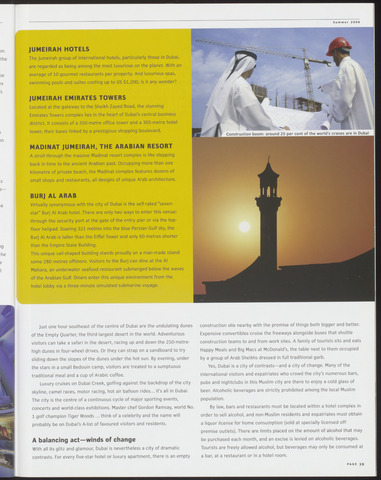JUMEIRAH HOTELS
JUMEIRAH EMIRATES TOWERS
MADINAT JUMEIRAH, THE ARABIAN RESORT
BURJ AL ARAB
A balancing act—winds of change
Summer 2006
The Jumeirah group of international hotels, particularly those in Dubai,
are regarded as being among the most luxurious on the planet. With an
average of 10 gourmet restaurants per property. And luxurious spas,
swimming pools and suites costing up to US $1,200, is it any wonder?
Located at the gateway to the Sheikh Zayed Road, the stunning
Emirates Towers complex lies in the heart of Dubai's central business
district. It consists of a 350-metre office tower and a 305-metre hotel
tower, their bases linked by a prestigious shopping boulevard.
A stroll through the massive Madinat resort complex is like stepping
back in time to the ancient Arabian past. Occupying more than one
kilometre of private beach, the Madinat complex features dozens of
small shops and restaurants, all designs of unique Arab architecture.
Virtually synonymous with the city of Dubai is the self-rated "seven-
star" Burj Al Arab hotel. There are only two ways to enter this venue:
through the security port at the gate of the entry pier or via the top-
floor helipad. Soaring 321 metres into the blue Persian Gulf sky, the
Burj Al Arab is taller than the Eiffel Tower and only 60 metres shorter
than the Empire State Building.
This unique sail-shaped building stands proudly on a man-made island
some 280 metres offshore. Visitors to the Burj can dine at the Al
Mahara, an underwater seafood restaurant submerged below the waves
of the Arabian Gulf. Diners enter this unique environment from the
hotel lobby via a three-minute simulated submarine voyage.
Just one hour southeast of the centre of Dubai are the undulating dunes
of the Empty Quarter, the third-largest desert in the world. Adventurous
visitors can take a safari in the desert, racing up and down the 250-metre-
high dunes in four-wheel drives. Or they can strap on a sandboard to try
sliding down the slopes of the dunes under the hot sun. By evening, under
the stars in a small Bedouin camp, visitors are treated to a sumptuous
traditional meal and a cup of Arabic coffee.
Luxury cruises on Dubai Creek, golfing against the backdrop of the city
skyline, camel races, motor racing, hot air balloon rides... It's all in Dubai.
The city is the centre of a continuous cycle of major sporting events,
concerts and world-class exhibitions. Master chef Gordon Ramsay, world No.
1 golf champion Tiger Woods think of a celebrity and the name will
probably be on Dubai's A-list of favoured visitors and residents.
With all its glitz and glamour, Dubai is nevertheless a city of dramatic
contrasts. For every five-star hotel or luxury apartment, there is an empty
construction site nearby with the promise of things both bigger and better.
Expensive convertibles cruise the freeways alongside buses that shuttle
construction teams to and from work sites. A family of tourists sits and eats
Happy Meals and Big Macs at McDonald's, the table next to them occupied
by a group of Arab Sheikhs dressed in full traditional garb.
Yes, Dubai is a city of contrasts—and a city of change. Many of the
international visitors and expatriates who crowd the city's numerous bars,
pubs and nightclubs in this Muslim city are there to enjoy a cold glass of
beer. Alcoholic beverages are strictly prohibited among the local Muslim
population.
By law, bars and restaurants must be located within a hotel complex in
order to sell alcohol, and non-Muslim residents and expatriates must obtain
a liquor license for home consumption (sold at specially licensed off-
premise outlets). There are limits placed on the amount of alcohol that may
be purchased each month, and an excise is levied on alcoholic beverages.
Tourists are freely allowed alcohol, but beverages may only be consumed at
a bar, at a restaurant or in a hotel room.
PAGE 39

